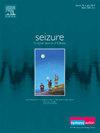Monitoring cognition in people with epilepsy and intellectual disability
IF 2.8
3区 医学
Q2 CLINICAL NEUROLOGY
引用次数: 0
Abstract
Monitoring cognition is essential in patients with epilepsy and intellectual disability (ID) to assess the course of the disease and its treatment. Patients with developmental or non-developmental ID are particularly vulnerable, as they more frequently experience severe medical conditions (such as seizures) and cognitive or psychiatric comorbidities than individuals with average intelligence. Given the difficulties in assessing patients with ID, this study aims to contextualise the current field of cognitive screening for patients with epilepsy and moderate or severe ID. To this purpose, this narrative review offers a critique of current approaches and provides a practical framework for individualised patient care. Furthermore, it highlights the challenges in assessing cognitive and behavioural changes in this population and focuses on the need for assessments that adapt to individual patient capabilities. It addresses the specific cognitive domains that should be evaluated and provides an overview of the tools employed, analysing the advantages and limitations of subjective and objective measures. Finally, it examines different procedures for assessing cognitive changes and considers future directions, such as the potential for new technologies, to improve exploration accuracy. In conclusion, objective screening tools to monitor intrasubject short-term changes in this population are necessary. The current approach is eclectic, which combines various age-adjusted and domain-specific tests. Future efforts should incorporate measures based on the WHO International Classification of Functioning, daily living activity scales, and surrogate markers for cognition (e.g., eye-tracking, AI-driven motion analysis, and wearables) to fill diagnostic gaps and improve the precision of cognitive monitoring in these patients.
监测癫痫和智力残疾者的认知能力
监测认知是必不可少的癫痫和智力残疾(ID)患者评估病程及其治疗。发展性或非发展性ID患者特别容易受到伤害,因为他们比平均智力的人更频繁地经历严重的医疗状况(如癫痫发作)和认知或精神合并症。鉴于评估ID患者的困难,本研究旨在对当前癫痫和中度或重度ID患者的认知筛查领域进行背景分析。为此目的,这篇叙述性的评论提供了对当前方法的批评,并为个性化患者护理提供了一个实用的框架。此外,它强调了在评估这一人群的认知和行为变化方面的挑战,并着重于适应个体患者能力的评估需求。它解决了应该评估的特定认知领域,并概述了所使用的工具,分析了主观和客观测量的优点和局限性。最后,它考察了评估认知变化的不同程序,并考虑了未来的方向,如新技术的潜力,以提高勘探的准确性。总之,有必要使用客观的筛选工具来监测这一人群的受试者内短期变化。目前的方法是折衷的,它结合了各种年龄调整和特定领域的测试。未来的工作应结合基于世卫组织国际功能分类、日常生活活动量表和认知替代标记(例如眼动追踪、人工智能驱动的运动分析和可穿戴设备)的措施,以填补诊断空白,提高这些患者认知监测的准确性。
本文章由计算机程序翻译,如有差异,请以英文原文为准。
求助全文
约1分钟内获得全文
求助全文
来源期刊

Seizure-European Journal of Epilepsy
医学-临床神经学
CiteScore
5.60
自引率
6.70%
发文量
231
审稿时长
34 days
期刊介绍:
Seizure - European Journal of Epilepsy is an international journal owned by Epilepsy Action (the largest member led epilepsy organisation in the UK). It provides a forum for papers on all topics related to epilepsy and seizure disorders.
 求助内容:
求助内容: 应助结果提醒方式:
应助结果提醒方式:


